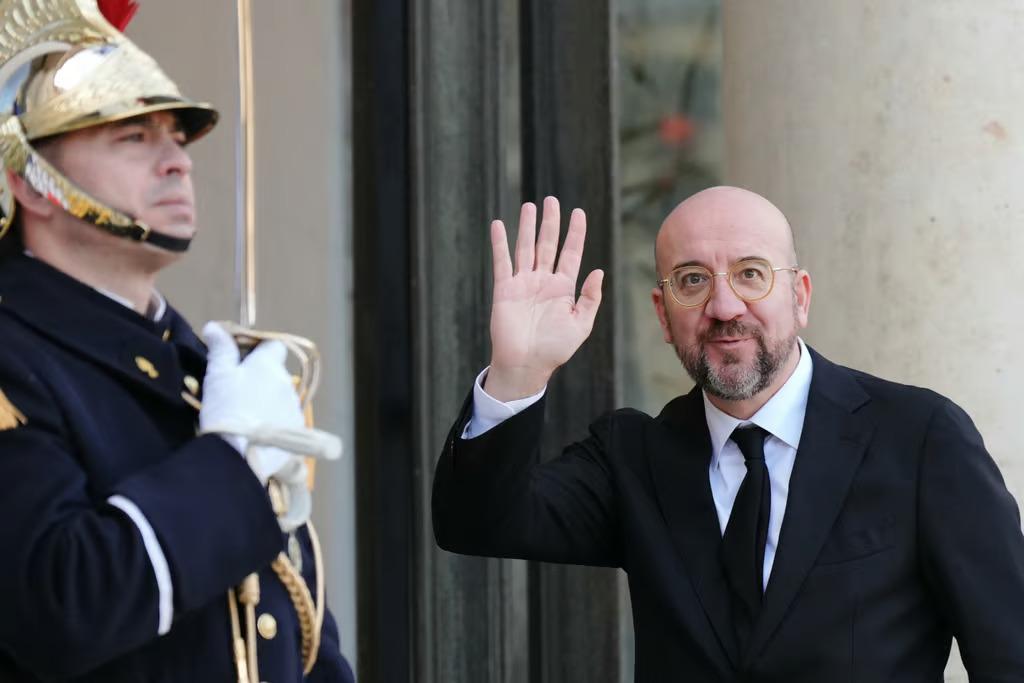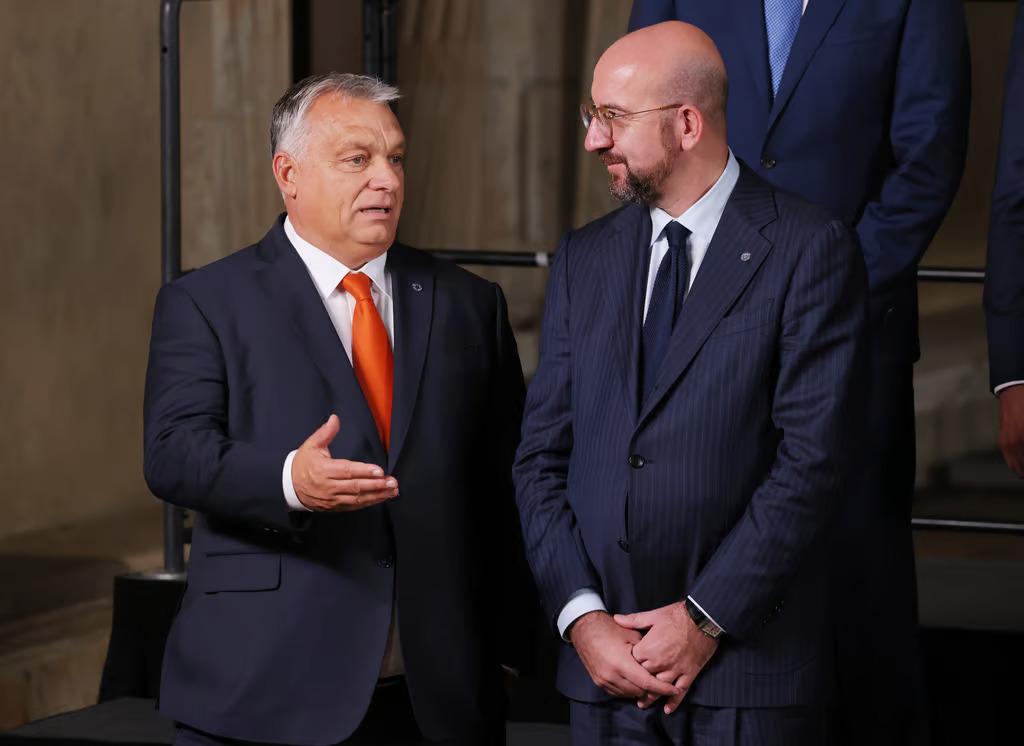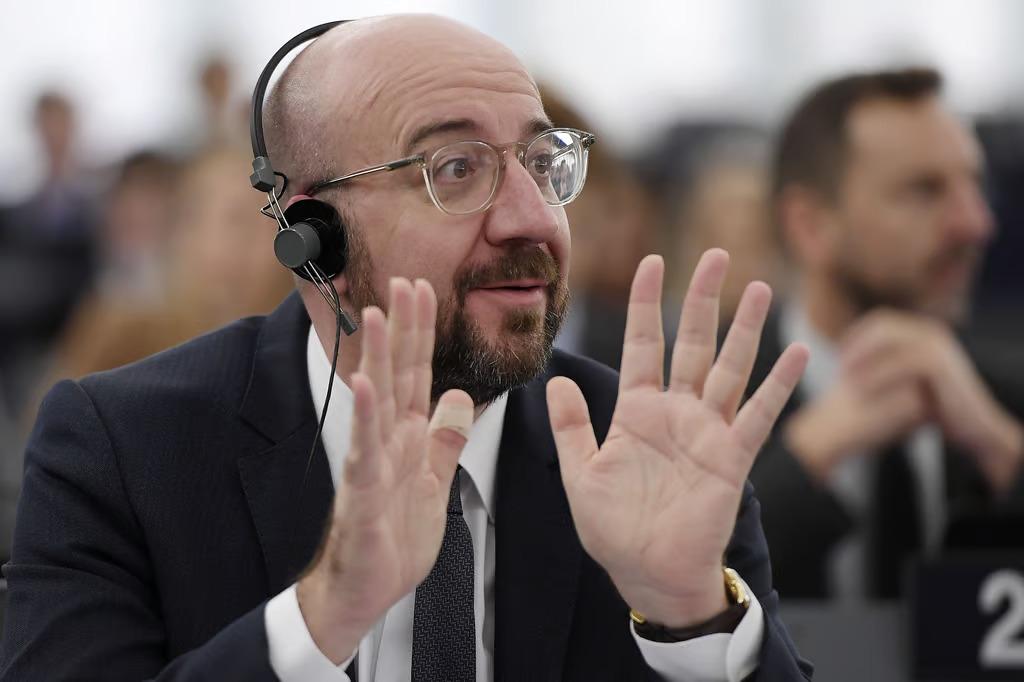What Charles Michel’s decision to run for EU election means for him and Europe Analysis by Politico
Politico has published an article saying that European Council chief says he will contest June’s vote, which could pave the way for Viktor Orbán to host leaders’ meetings. Caliber.Az reprints the article.
You’re supposed to set off fireworks on New Year’s Eve. Charles Michel waited until January 7.
The president of the European Council — which brings together the leaders of EU member countries — announced he will run as a candidate in the European parliamentary election in June. If he’s elected, he would take up his seat in July, well before his term is scheduled to end in November.
Why is that a problem? Because without a permanent Council chief, Hungarian PM Viktor Orbán, whose country takes over the rotating presidency of the Council of the EU in July, would lead the meetings instead. That’s a nightmare scenario for Brussels if the increasingly isolated Euroskeptic leader, who has attempted to thwart much of Brussels’ support to Ukraine amid its war with Russia, is handed such an opportunity.
Thanks to Michel’s move, the EU is in uncharted waters. The job of European Council president has existed only since 2009 when it came into being as part of the EU-reforming Lisbon Treaty. The job involves setting the European Council’s agenda and work schedule, as well as mediating between member states and representing the bloc on the international stage. Before Michel there were only two men (a woman has never held the role) to have done the job: the, er, magnetic Belgian Herman Van Rompuy and shrinking Polish violet Donald Tusk (whatever happened to him?).
Michel has also now fired the starting pistol on the top jobs race, in which the EU’s leaders divvy up the spoils between the bloc’s main political groupings based on the results of the EP election (or by ignoring that election altogether and doing what they damn well please). The other politicians considering a run at an EU top job (including Michel’s nemesis from across the street, Commission President Ursula von der Leyen, who has yet to declare if she wants a second term, as well as those rumored to fancy a new EU gig such as Danish PM Mette Frederiksen) may now have to show their hand earlier than anticipated.
Let’s take a deeper look at what this all means.
Politicians resign all the time. Why does this one matter?
Because it sends an odd signal about the importance, or lack thereof, of the European Council president’s job.
It’s almost impossible to imagine a U.S. president stepping down just six months before the end of their term, barring a case of force majeure like, erm, their assassination. Likewise, the drafters of the Lisbon Treaty didn’t foresee any scenario in which there would be an early exit barring an unspecified “impediment” or a “termination,” neither of which apply here.

So Michel’s early exit — amid an epic standoff with Hungary over the bloc’s policy of support for Ukraine — seems to signal, on one hand, that Michel doesn’t see his role as being terribly important. But on the other hand, it could also show that he is happy to leave the task of solving the EU’s problems to a successor, whoever that may be. For some diplomats, this could have positive implications by starting a debate on the top jobs now rather than having last-minute battles. Yet others don’t like the uncertainty as the EU faces two wars in its vicinity and a possible Donald Trump presidency in 2024.
“It’s clear that [Michel’s departure] doesn’t help on topics of foreign affairs,” said a French diplomat who, like others in this piece, was granted anonymity to discuss a sensitive topic.
Will Viktor Orbán become interim Council boss?
One reason why this is causing an early-January stir is that Michel’s early exit raises the possibility that Orbán could become European Council president by default. That’s because Budapest is taking over the EU’s rotating presidency in mid-2024 and if there’s no European Council chief, the leader of the country in the presidency chair would take over. Oh, the irony!
The prospect of Orbán chairing leaders’ meetings didn’t surprise one EU official who said that, inside the Council building, there has long been speculation about such as scenario, a sign that Michel was planning his move for a while. And, according to an official close to Michel, the leaders were not caught off-guard and mostly agreed with his move. “He contacted all the 27 and a broad majority supported the decision,” the official said.
So having Orbán in charge seems not to have scared the leaders. That’s probably because Michel’s office made clear that, legally, a simple majority would be enough to prevent Budapest taking the chair — although, one of the diplomats was quick to point out, that would essentially be a declaration of war against Orbán.

The diplomats who aren’t freaking out say that’s because there’s enough time to find the right name to replace Michel. “Last time on July 2nd it was all done,” said one of the diplomats. Three others made similar remarks.
Yet the name of the European Council’s president is usually part of a package, agreed upon by leaders along with the European Commission president and the EU’s top diplomat. And, with polls showing the far-right on the rise “this time it could be more complicated to form a majority or we could have a very thin majority,” argued a senior EU official, which means that it could take longer to get people into jobs.
Is Michel going to campaign for the EP election and if so can he still do the Council job? Is the Belgian PM in charge now?
Michel’s office said he will campaign like any other leader would. The prime minister “of a country classically executes his function while still being able to campaign in and for national parliamentary elections. It would be the same case for the president of the European Council for, in this case, European Elections,” said the official close to Michel.
But how Michel will campaign has raised questions, especially as what he does could impact von der Leyen when she announces she wants a second term, as is expected. Michel is supposed to speak on behalf of the 27 countries, which he can’t do when he’s campaigning for a seat in the EP.
These doubts were summed up by a diplomat who said: “We will all keep a really close watch on what Michel will say and do during his campaign for the European Parliament” as “he can’t take any positions that will undermine his position as president” of the European Council.
Another aspect is who will be in charge of mediation between states. Before the creation of Michel’s job, it was the role of the rotating presidency to forge compromises. Right now, that role would fall on another Belgian, Prime Minister Alexander De Croo. However, he has downplayed expectations: “There is a certain timeframe now in the next months to see how things can be organized. If I can play a role in that, obviously I will play my role in that,” he told reporters on Monday. But “expecting that it is Belgium that is going to impose a solution on others, that’s not how to work.”

A majority of diplomats POLITICO spoke to say that the burden of mediating will likely fall on key leaders like Germany’s Olaf Scholz or France’s Emmanuel Macron, as well as the Netherlands’ Mark Rutte, while he remains in office (he’s one of the EU’s longest-serving prime ministers), Poland’s Donald Tusk (as a former European Council president) and Italy’s Giorgia Meloni (as she has a good relationship with Orbán).
Does Michel really want to be an MEP? What else is he after?
Michel getting a seat in the European Parliament is almost guaranteed. But the former Belgian prime minister’s ambitions are expected to lie elsewhere, with the European assembly as a backup.
Michel could try to run as the liberal Renew Europe’s pick for European Commission president. A spokesperson for Michel did not confirm or deny this possibility, but people close to the Belgian stressed he would be Renew’s most senior and experienced candidate.
In theory, even failure to become Commission chief could open the door to another European top job, such as succeeding Josep Borrell as the EU’s foreign policy chief or taking over from Didier Reynders as the next Belgian commissioner (Reynders, the EU justice commissioner, is hoping to become the next secretary-general of the Council of Europe, the international human rights organization).
But Michel would face an uphill battle. His track record as European Council president has been heavily criticized (one EU diplomat said: “His track record as Council president is not particularly impressive. It will be key for his successor in this role to take a step back and act more from the background”), and his relationship with von der Leyen, if she as expected runs for a second term, is far from ideal, to put it mildly.
Belgium may also want to send a politician of a different political stripe to the European Commission, as Reynders hails from the same French-speaking liberal party as Michel. That decision will depend on difficult coalition talks after the Belgian elections on June 9 (which coincide with the European elections).
The European Parliament run can also be seen as a detour back to Belgian politics, one Belgian official and one EU official said. Michel’s predecessor, Tusk, went back to Polish politics and is now prime minister. Michel’s influence within his Belgian francophone liberal party (MR) is still strong and within Belgium, he is seen as a potential rival to others with ambitions to enter Rue de La Loi 16, where the Belgian prime minister has their office.
However, given the expected rise of the far-right in the Belgian elections and the complicated coalition negotiations that are likely to follow (remember, Belgium once went 541 days without a government), Michel may not get any clarity on his Belgian ambitions any time soon.
Do we even need an EU Council president?
The complicated dynamic between the European Council and European Commission presidents has long been an issue, including when Tusk and Jean-Claude Juncker were in office. It’s a dynamic that has often been referred to by diplomats as a “kindergarten.”
With Tusk and Juncker, the rivalry was more among top officials in their offices. With von der Leyen and Michel it’s different, as the lack of chemistry directly affects the two bosses. It exploded with the Sofagate scandal in 2021, when Michel and von der Leyen were meeting with Turkish President Recep Tayyip Erdoğan and there were only two chairs and two sofas in the room. Michel sat in the chair beside Erdoğan while von der Leyen was offered a seat on a sofa
So it’s natural to keep hearing calls that the two positions should be merged, to make EU decision-making more efficient and avoid embarrassing public displays of disunity.
The last person to issue such a call was the former president of the European Parliament, and current Italian foreign minister, Antonio Tajani, who in an interview on Sunday (January 7) said “many agree” on it although “the change would involve a revision of the Treaties, which could discourage even starting the discussion.”
Diplomats agree that starting such a debate would indeed open Pandora’s box and that many leaders like the EU having lots of top jobs — just in case they need work in future.








